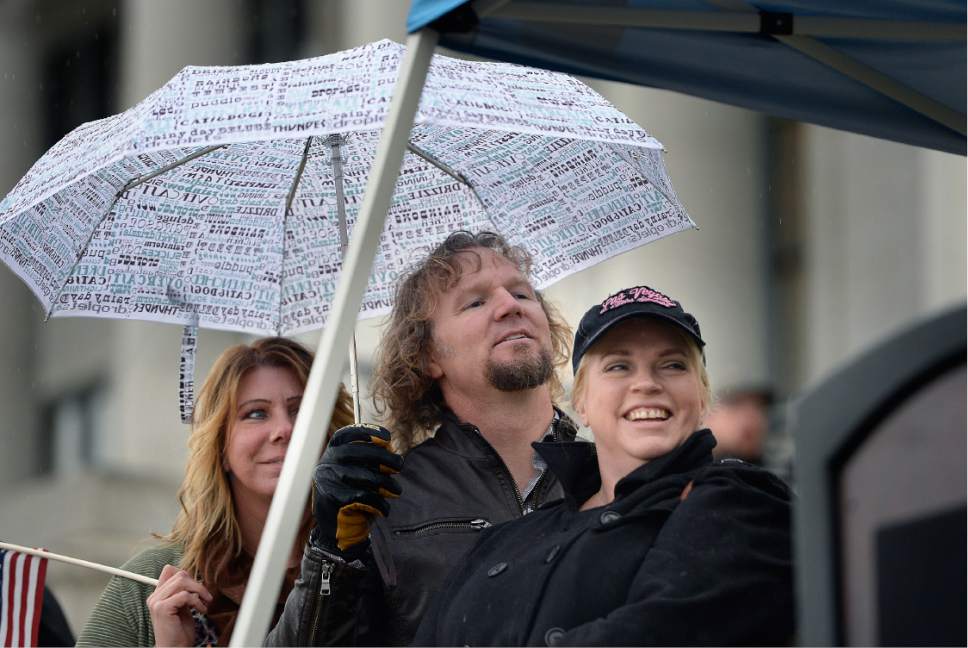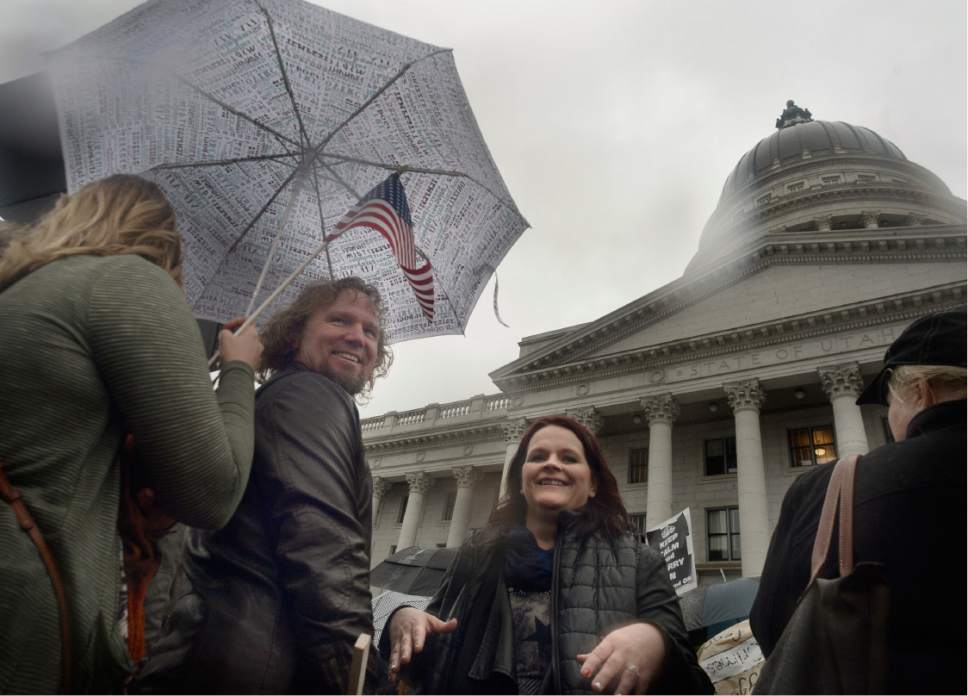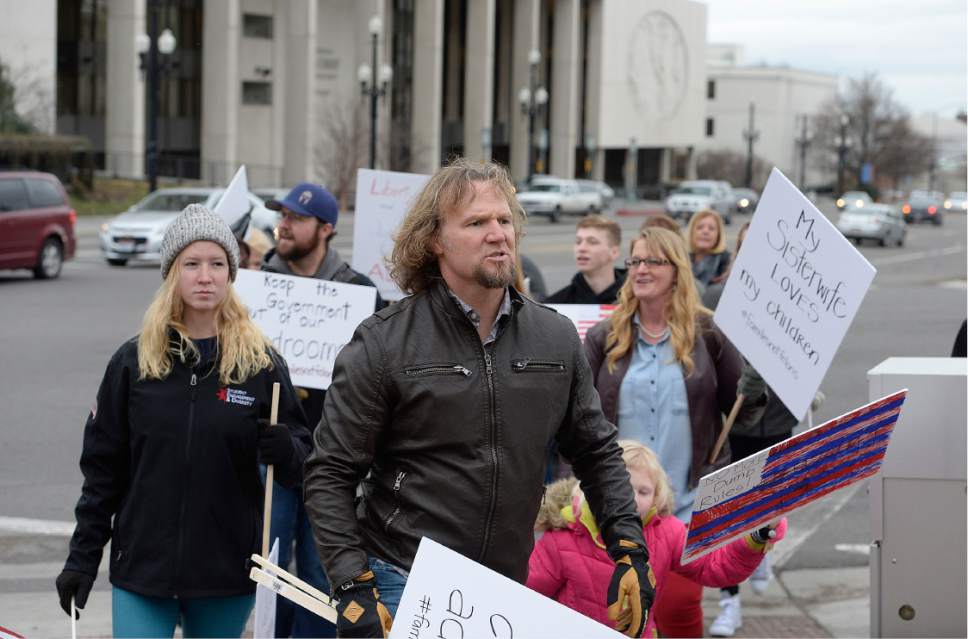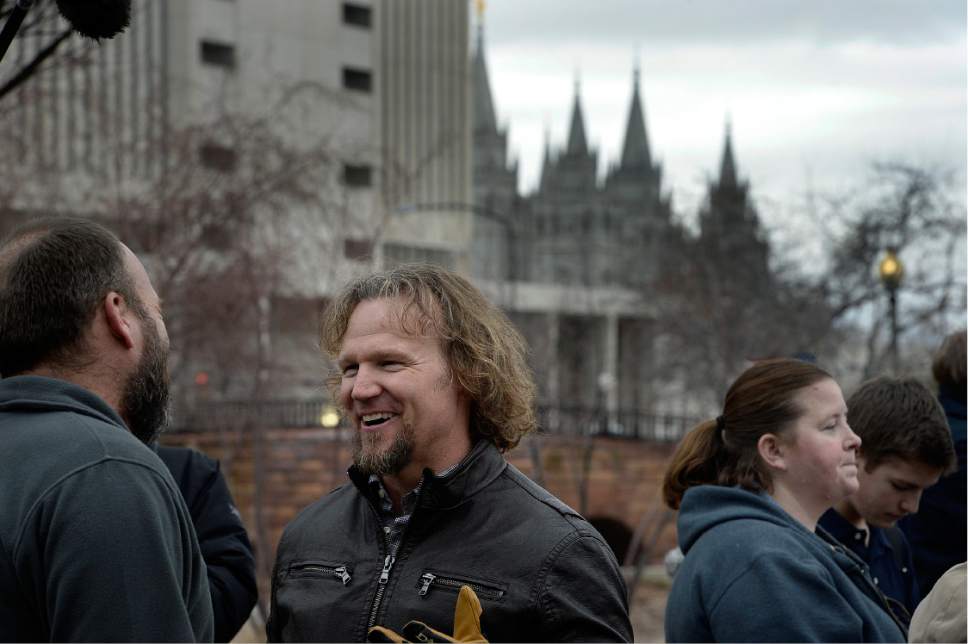This is an archived article that was published on sltrib.com in 2017, and information in the article may be outdated. It is provided only for personal research purposes and may not be reprinted.
The polygamists from the reality show "Sister Wives" who won, for a time, a lawsuit against the state of Utah that spurred a new bigamy bill decried that legislation and said polygamists should think about moving.
"My concern is all this is going to do is drive the good polygamous people who don't have those abuses more into hiding," said Meri Brown, a plural wife, "and it's going to make the people who do have those abuses just be able to do them even more."
"It also classifies all polygamists as second-class citizens," added her husband, Kody Brown.
Kody and Meri Brown spoke to The Salt Lake Tribune on Friday as they drove from their home near Las Vegas to Utah on a business trip. Kody is legally married to another woman, Robyn, and is spiritually married to Meri and Janelle and Christine Brown. They are members of the Bluffdale-based Apostolic United Brethren.
The family moved to Nevada after their television show premiered in 2010 to avoid the risk of being prosecuted in Utah. Meri Brown said if Utah's governor signs the bill passed Thursday, other polygamists should think about leaving the Beehive State, too.
"I hope that good, loving consenting adult polygamous families look at this and think about what they want to do," she said. "Do they want to stay there and live under this kind of oppression and go back to living underground like they did 40, 50, 60 years ago or do they want to rethink their residence?"
For about 2½ years, the Browns could say they decriminalized polygamy in Utah. When they went public with their lifestyle in 2010 for their reality show, it spurred a criminal investigation for bigamy by Lehi police.
No charges were filed and the Browns moved to Nevada to escape any chance of prosecution. They then filed a lawsuit alleging Utah's bigamy statute was unconstitutional. A federal judge in Salt Lake City ruled in their favor in December 2013, but the 10th U.S. Circuit Court of Appeals overturned the decision last year, saying the Browns lacked standing since they were never prosecuted. The U.S. Supreme Court declined to hear another appeal.
The analysis from the federal judge spurred Rep. Mike Noel, R-Kanab, to sponsor and push HB99, which would change the definition of bigamy. It also would increase the penalty for bigamy in some circumstances. Noel mentioned the Browns' lawsuit multiple times and said he was trying to bring the bigamy statute into compliance with the Utah Constitution, which prohibits polygamy.
The Utah Legislature passed HB99 on Thursday with five minutes to spare in the session. A spokeswoman for Gov. Gary Herbert on Friday said he has not determined whether he will sign the bill.
The measure would add criteria for being prosecuted for bigamy: The offender must live with the extra spouse and "purport" to be married. Current state law requires only one or the other.
HB99 would keep bigamy a third-degree felony punishable by up to five years in prison, but those penalties could increase to 15 years if bigamy is prosecuted in conjunction with crimes such as abuse, fraud or human smuggling. Anyone leaving a polygamous marriage and reporting abuse or protecting a child would receive amnesty.
The Utah attorney general's office and county prosecutors who have addressed polygamy have said they have policies against prosecuting consenting adults whose only offense is bigamy.
Kody Brown said Friday he has no regrets about coming out or filing the lawsuit. He accused the state of using a "rope-a-dope" strategy. During the lawsuit, the Utah attorney general's office argued polygamy is inherently harmful to women and children, but that the bigamy statute had never been used against the Browns.
But HB99, Brown said, would amend the statute so otherwise law-abiding polygamists like himself could be prosecuted.
"Polygamy and abuse are not synonymous, no matter what people who have been abused in the culture of polygamy say," Brown said.
Some people from polygamous families disagree. On the same day last month that the Browns returned to Salt Lake City to lead polygamists in a March up State Street to the Capitol, they were met by a smaller group of women who were the children of polygamists or plural wives themselves. They asserted they were neglected by disinterested fathers or husbands and mothers who were too poor to provide for them.
Meri Brown said the bill won't do much to end polygamy in Utah.
"I'm sure it would be a discouragement, but I think it would be more of [polygamists] deciding to just stay super-secret," she said. "Those women who have to pretend like they don't have a husband even though they get pregnant and have children, it will be bad for them when that's not what their value system is.
"Most people that I know are going to live plural marriage because they feel like it's right in their heart," she added.
The debate over HB99 included discussion of who had the right to the word "Mormon." Noel, the bill's sponsor, is a member of The Church of Jesus Christ of Latter-day Saints, which officially disavowed polygamy in 1890 and excommunicates members found practicing it.
On the House floor, Noel said he was offended by polygamists calling themselves "Fundamentalist Mormon."
"They are an apostate group and they are no part of my religion," he said.
Kody and Meri Brown said they want no part of any debate over who the true Mormons are.
"Nobody owns a corner on the market on Jesus, man," Kody Brown said.
"If [LDS members] want the title, they can have the title," Meri Brown said. "But for me, let me live how we want to live."
Twitter: @natecarlisle













